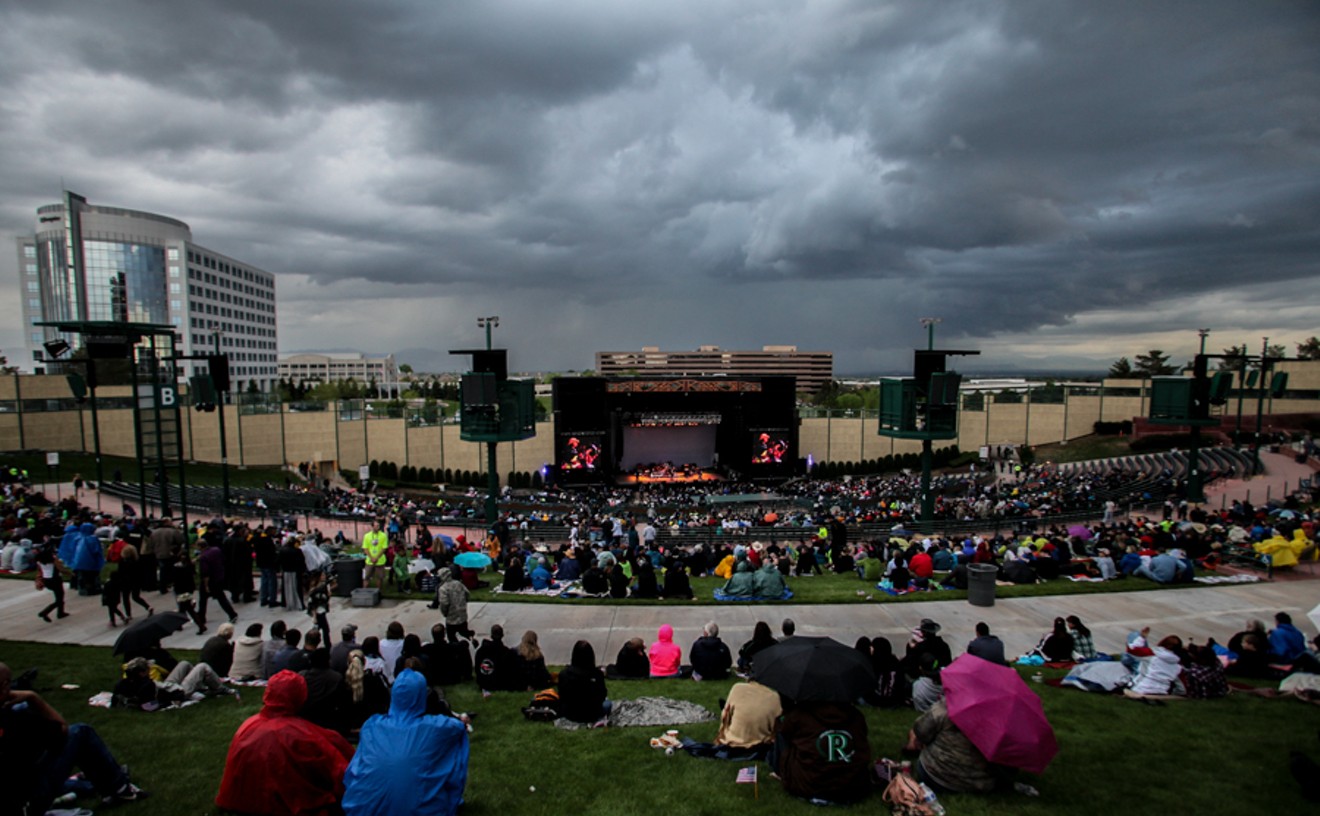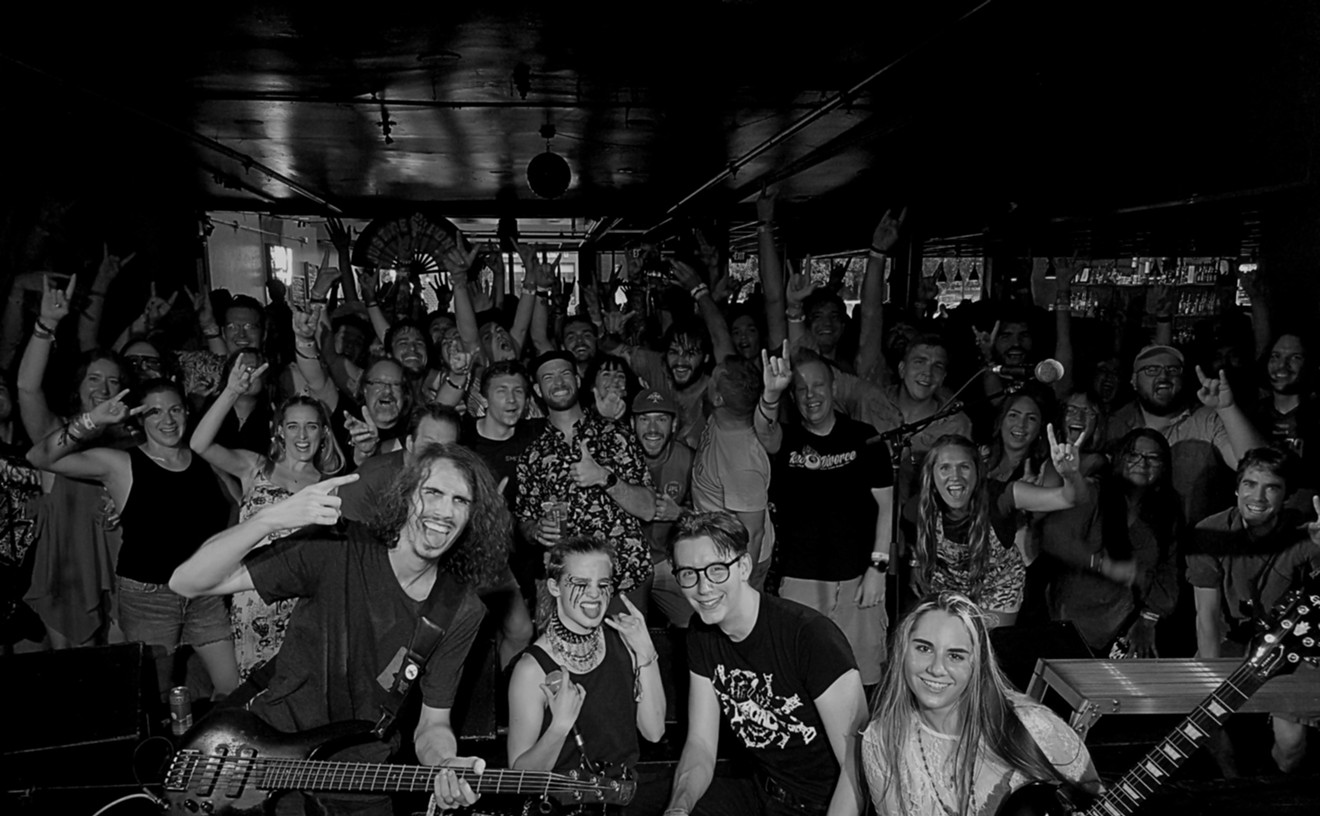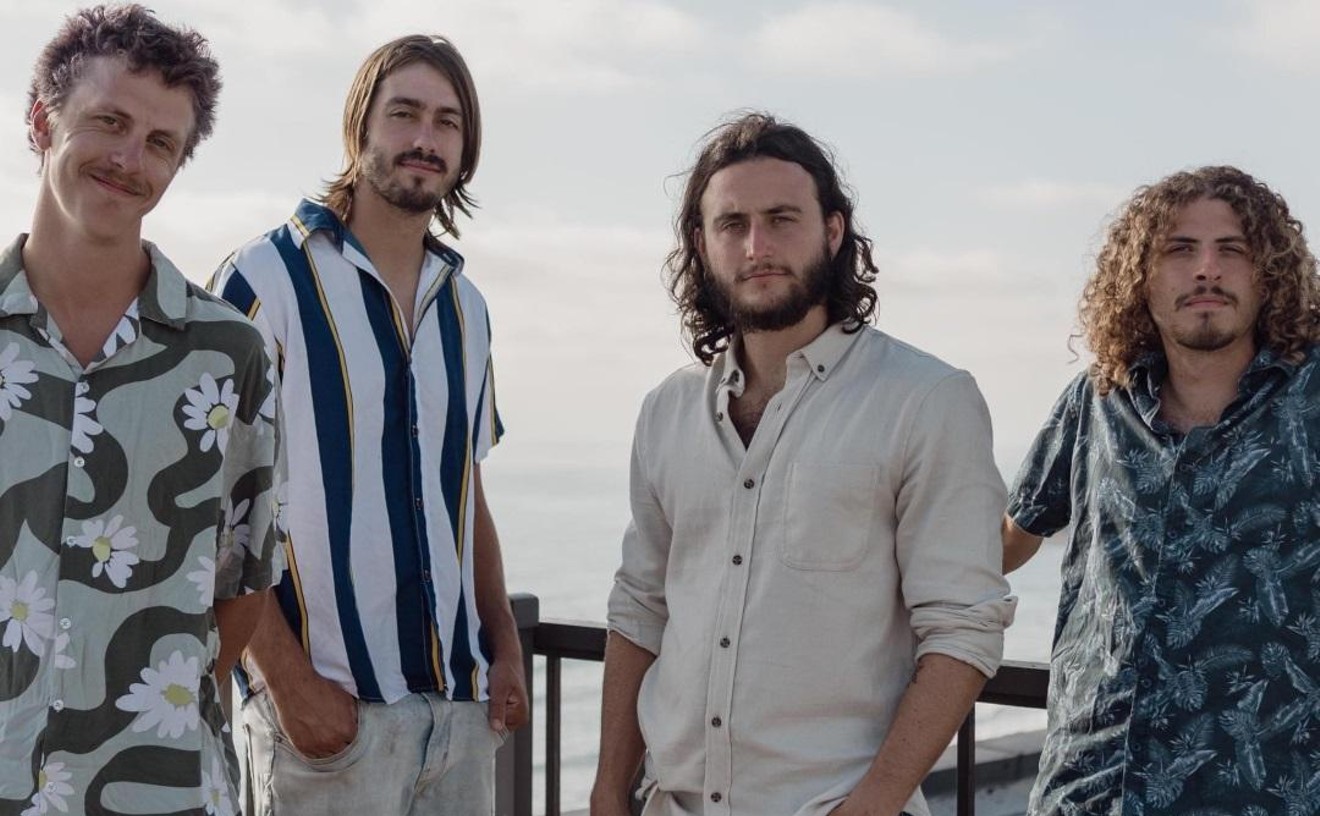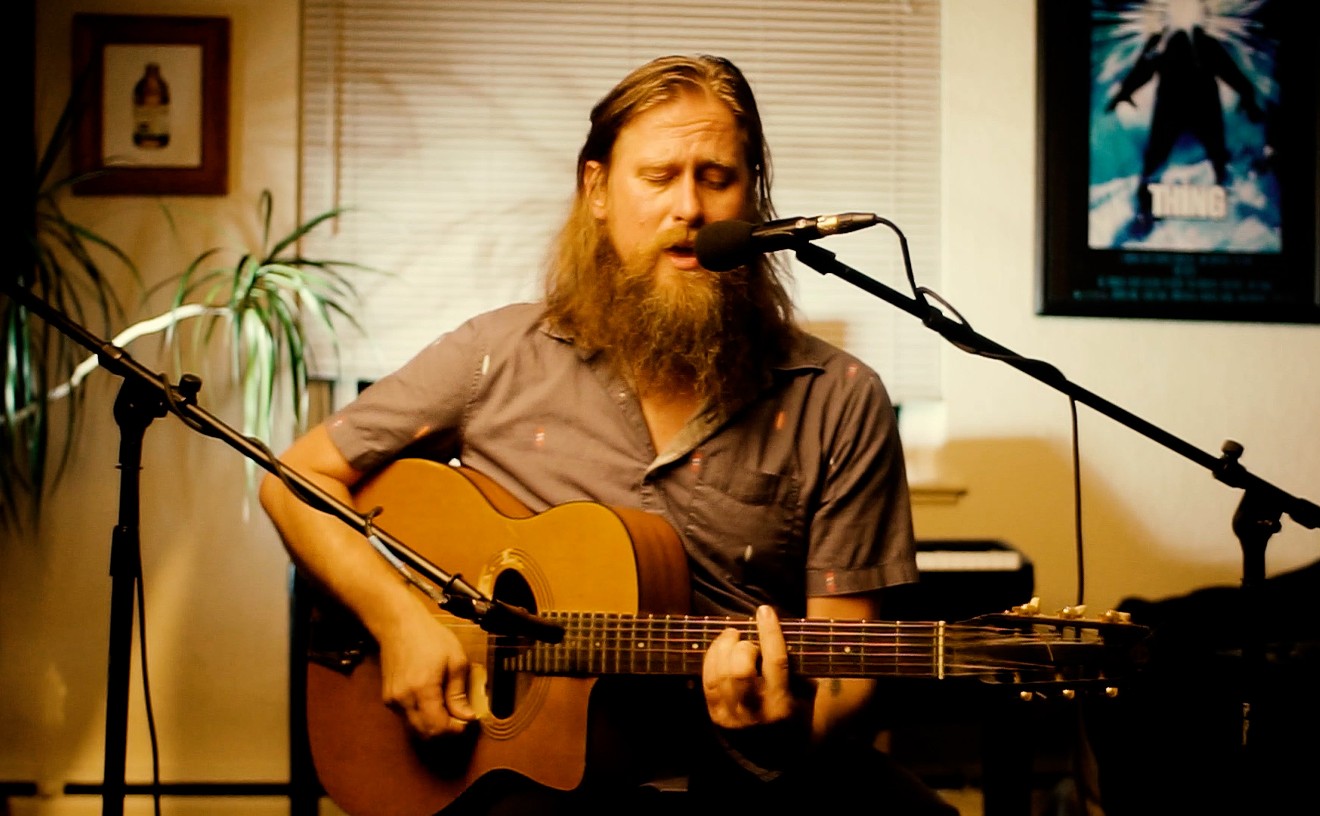It took decades, but Joan Baez has finally overcome her stage fright. The legendary folk singer and activist, who initially found fame during the folk renaissance of the 1960s, partnering with Bob Dylan on stage and fighting for a wide range of causes into the '70s, '80s and '90s, says she's discovered a newfound sense of creative comfort and inspiration in the past several years.
See also: - Saturday: Joan Baez at Chautuqua Auditorium, 6/1/13 - Sunday: Joan Baez at the Arvada Center, 6/2/13 - Denver Folklore Center celebrates fifty years
The past decade has seen the most dramatic growth for Baez. A 2009 episode of the PBS series American Masters revisited her musical achievements and turned a new generation on to her work. The past year has been particularly tumultuous, as Baez spent a good part of the past twelve months with her mother, who died at the age of 100 in April. We caught up with Baez to talk about her history in Denver, the loss of her mother, her newfound love of painting and her revived enthusiasm for playing on the road.
Westword: I wanted to start out with some local history. I bought a few of my first guitars at the Folklore Center out here, and I'm not sure if you remember the place.
Joan Baez: I do.
I read that you came to Denver the first time in 1964 by train, and that Folklore Center founder Harry Tuft picked you up at Union Station and drove you to the gig.
That's right. I remember the Folklore Center was appropriately folky, and that they had great stuff there, and that Harry was a great guy in every sense of the word.
What else do you remember about your first trip to Colorado?
Well, the overwhelming memory is, of course, that I sang at Red Rocks, and that was wonderful. The Beatles came in the next night on their first tour. That kind of wipes out any other memories I might have had, because I was backstage when they went on stage, and it lit up like day with the flashes, and the screaming was so loud. The energy was so out of whack that if I'd seen everybody lurch out of their wheelchairs, I wouldn't have been shocked at all, you know. It was crazy. But I've always loved going to Denver and Boulder, I must say, just because it's beautiful, and the people are smart.
How did Red Rocks compare to some of the other places you'd played?
I'm not going to remember very well, but I guess I'd been at it for a while, for four or five years. I'd seen some very big places, but Red Rocks stood out because it was so beautiful. I mean, it was one of those outdoor miracles. It was also hard to breathe, but it was compensated for by the public and by the hall.
You've made a point of stopping pretty regularly here since then. For all of the ups and down that folk music has had nationally, it seems like it's always had a reliable anchor out here. Is that one of the reasons you kept coming back?
I hadn't thought of it, but I get it when you're saying that. It's probably largely due to the Folk Center.
Have you spent much time touring with the younger folk acts?
I'm not spending a lot of time doing that. I don't usually share concerts with people. I will now with the Indigo Girls and some of the younger groups. But Jackson Browne and Emmylou [Harris] and I are getting together on stage to do a concert for a homeless group. It has a certain quality to it when there are legendary pipes all on one stage. When that happens, then we do start reminiscing, because there's so much to reminisce about. For me, anyway, you're talking about 53 years.
Speaking of that benefit show for the homeless group, one of the quotes from you that I remember from the documentary had to do with the fact that social justice is more important for you than music. Does that still hold true?
Yeah, I think it's very important for me to say that I'm not pretending to be championing anything at the moment, because I've done that so much in my life that people have an image of me doing that. The image that I'd like them to have for a while, anyway, is me spending a lot of time with my mom as she was getting older and as she was dying and as she died. That was as important to me as anything else I can imagine in this society that doesn't really deal with death very well. It occupied a lot of my life, and she did die, and I did learn. It was an extraordinary journey.
The other part was that my life was going to places I knew nobody else would go to, and doing the things that they probably couldn't do. At the moment, I think I see fairly clearly the state of the world, and I know that it's changed from the '60s, that it's almost impossible to find something to latch on to, you know, as far as organizing. I've kind of boiled it down to little victories and big defeats.
The state that the world is in can be one big defeat, because it's so terrible and if I had one thing that I would say is my major concern, it's global warming. Because when I think of my granddaughter who's nine, I can't see how she's going to have a future beyond fifteen years. At the same time, I'm not pretending to be out on the front lines of that trying to reverse climate changes.
But what I do think is that maybe because of the big defeat as the backdrop, all of the little victories are more important. I mean, young people who are willing to do anything -- I know a couple of people who went out and lived with the homeless for a while. I mean, for real. They didn't go back to the Holiday Inn at night. To learn about life and other people's lives and to keep tuned into compassion and empathy and caring and sacrifice in these decades of greed, I think, is enormously important.
Going back to the time you spent with your mother, I read about the domicile you constructed for yourself in a treehouse behind her home in California.
[laughs] Yeah, it was just a platform.
What did you learn about your mother and yourself in that process?
The first thing I learned was how tough I am. My grandmother lasted to 94, and my mom lasted to 100. I learned that we're all probably going to get cranky and that we're all probably going to die with our mouths open. It's not a very glamorous thing. It was a glimpse into my own future. She was 100. I'm 72. That's not all that long or all that short. I'll probably forever look at it in a different way from before her death.
By the way, you should know this: My mother was a very witty and sarcastic, funny person. We were planning her birthday party, which ended up being 150 people and which she wanted to have. I said, 'Well what do you want to do on your birthday, mom?' She said, 'Drop dead.' And she proceeded to do so after the party. She lasted one week after the party. That was it.
Following that process and all of the emotional weight that it carried, how has it been returning to normal life and to music?
That's a good question. I started painting about a year and a half ago. That's what's carrying me right now. I work in acrylics, and I started doing portraits, and I love it so much. The upside is that I have more time for that to really go into it deeply, and I just feel so fortunate that I have something that I really want to do. You don't sing forever. The vocal chords start to be too obnoxious to deal with. It's a really, really difficult thing to sustain. I won't do it forever and I'll be able to paint.
Even if you don't sing forever, does the guitar still hold therapeutic qualities for you?
Not really, because I've gotten so lazy. I used to play so much better than I do now, because I am lazy and because I have this brilliant musician who plays seven instruments. I don't need a band. I do my share of guitar playing, the way I always have, but for anything with flourishes, he does it, and I don't worry about it. You're thinking along exactly the right lines -- that doesn't take up a chunk of my life because I'm enjoying it [laughs].
So you just recently started painting?
A year and a half ago. I've sketched all my life and done some haphazard color things, but I've never really gotten serious about painting.
How has the role of music changed in other ways?
It's interesting, I've actually started to enjoy touring way late in the game because I've finally dropped the stage fright. I also, at a certain point, realized that I didn't have to have a cause, that I could walk out on the stage and sing for the joy of singing and the music. That was a big switch in my life that was a number of years back. And I love the bus. When I get out there, it's like family. It is family -- it's my road family. When someone says, 'Why are you still touring?,' I answer, 'Because I can.' The vocal coach, when I asked him, 'When will I know it's time to quit?,' he said, 'Your voice will tell you.'
How about song selection?
For a setlist, we have a skeleton of one. We'll get together the day before the concert, we'll take out this list and look at it and see what we still want to do. I travel with this guy who plays all of these instruments and my son [Gabriel Harris], who plays the cajón for percussion. We sit down and figure it out, what's going to work best and if there's something new should we try it out.
If we're bored with something, we'll drop it. We'll construct it that way, and the construction is, I have to cover fifty-some years and make it work. I think as long as it's fresh, it hardly even matters what I'm singing. If it sounds hackneyed and old and only nostalgia, I get queasy. We do everything we can to keep it fresh.
Are there songs that do stretch back fifty years that are still compelling for you as a performer?
That's a good question, too, because they're compelling, and they didn't used to be challenging, and now they are, just because it's harder to sing them. Basically, they're fifty-year-old songs, and trying to do the new ones and make them as appealing is probably the biggest challenge.
I want to go back to what you said about stage fright. How did you overcome that?
Yeah, therapy. It was simple. For the first umpteen years, I was seeing therapists because I was phobic and neurotic and didn't know how to sleep and all this stuff. They were helpful -- things changed a little bit over those years. But it wasn't until I did the deeper therapy and went in and dealt with the demons and the roots of all this stuff that things really changed. It was a long haul, and it was a big decision and I couldn't really face it until I was fifty, and that's where the real changes started. One day, after a certain amount of work, I woke up and the fear of flying was gone. It took a lot of hard work, and I would encourage anyone to do that work.
Follow @Westword_Music










